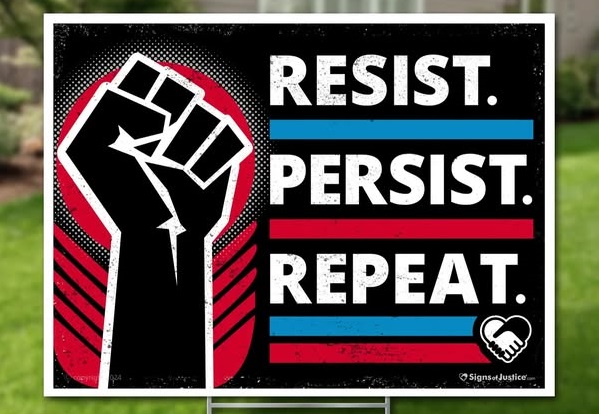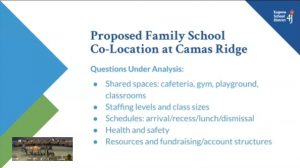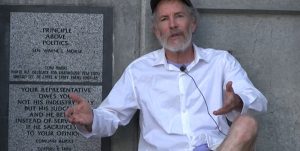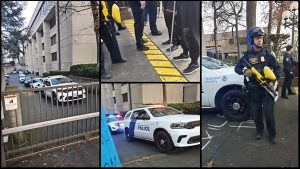Julie Lambert interviews the protesters of Resist, Persist, Repeat
9 min read
Presenter: For the KEPW program Legalize Survival, broadcast every Wednesday evening at 7, here’s Julie Lambert:
Julie Lambert: Hi, you’re listening to Eugene’s Resistance Radio, KEPW-LP 97.3 FM, and we have the honor of having with us a few ladies who started up a protest at the corner of 29th and Willamette, and this is every Monday. It’s called ‘Resist, Persist, and Repeat,’ and it starts at 10 a.m. at 29th and Willamette.
So what I’d like to do is, if you all could introduce yourselves and a little bit about yourselves, and then we’ll dig into some questions.
[00:00:43] Beth: My name is Beth and I’ve lived in Eugene since 1978 and I love Eugene. It’s a very good fit for me. I’ve been a community college teacher for my working career besides my at-home life.
[00:01:03] Lina: Hi, my name’s Lina. I’ve been living in Eugene since 1972, raised my family here and I love Oregon. I was raised in the East, so when I discovered the West Coast, it was a whole new awakening for me, and I do love Oregon. I do love this country.
[00:01:28] Cheryl: I’m Cheryl. I was born in Oregon and I’ve lived in Eugene since 1957. And like Lina said, I raised my one and only child here and I worked for a state agency that raised money for college scholarships. So when people ask me, what did you do in your career, I say I gave away other people’s money.
[00:01:49] So that was a, a ton of fun. I kind of hated to retire, but I’ve always been interested in history, political science, government, and that’s why I’m involved in the current thing that we’re all cooking up here.
[00:02:05] Julie Lambert: How did you get started? What was the catalyst? What changed?
[00:02:10] Beth: Well, I would say that it was the first nationwide protest. And once we saw that protest, we wanted to get involved in something that might be easy for us to do, right in our neighborhood.
[00:02:29] Lina: We were feeling pretty helpless. And we are all of the age that we have been able to protest in the past, back in the ‘60s, like a good bit of the country did, and it was something real that we could do, and we were so emotional and felt so strong after that first day.
[00:02:53] I remember walking back home and just feeling so full of energy and connection with people that I said, ‘We’ve got to do this again. We’ve got to do this every week.’ And we all agreed. And very quickly, it just felt right.
[00:03:14] And, you know, it anything that you can feel connected and a part of like this is just good for us. And the exchange that we have with people in their cars is so precious. The eyes connect, the hands wave, the chakas go up, and it’s wonderful.
[00:03:45] Julie Lambert: Thank you, Lina, very, very well expressed. We’ve seen that sort of communication happening at a grassroots level where communities are actually, folks are getting to know their neighbors now, whereas before maybe they didn’t know their neighbors. This phenomenon is happening nationwide, that kind of connection that you’re describing, and it keeps happening. And this networking is I think one of the ways that we’re going to be successful.
[00:04:15] Cheryl: Well, I agree that it’s wonderful to meet people that share your values and then to see how much effort they put into participating. And so then you feel like, I found my peeps. And we’ve all had experience doing this, I think, over the decades.
[00:04:34] So I think it seemed like a natural response when Beth sort of stirred the pot here, that we wanted to join hands and get out there and show the world that we still got some miles left. We can still do this because we have grandchildren. You know, we can’t give it up now.
[00:04:56] Beth: People keep saying that I am the, the person, but I’m not, I’m only the person that sends out the emails because I happen to have those particular skills. I can do an email list, I can sort of communicate, but it’s all sorts of other pieces. It’s the Indivisible Eugene Springfield that helps give me some collected information that I can give.
[00:05:23] It is Cheryl, who made sure we got the announcement in the Eugene Weekly. It’s a combination. And then because of the Weekly, we’re getting people from not just our neighborhood, right? It’s people coming from other parts of Eugene and Springfield.
[00:05:45] And we are making such important connections. I’m connecting with people I have lost touch with and I’m connecting with new people that it gives me such pleasure to do that.
[00:05:59] Cheryl: We do get a lot back. We do get a lot, we get a lot of feedback for our souls. I think doing this, as Lina said, we come back feeling so energized even though we’re, you know, dragging our sorry asses around.
[00:06:17] Julie Lambert: And that’s why I invited you to Legalize Survival, because tonight, basically, we’re standing up for various things that we feel passionately about: our democracy, in particular, at this point in time.
[00:06:32] So I have another question I’d like to run by you: How do you keep that going every week? You know, because every day we’re hit with a barrage of negative news stories that are in fact, strange but true. How do you keep coming back every week?
[00:06:49] Cheryl: I think it’s individual passion, but also I think the group is so important to keep us at the task because we don’t want to let down our chums. And as I said, I think we get a lot more out of it maybe than we put into it by showing up and expressing our opinions and knowing that the person next to us feels the same way and just as strongly.
[00:07:17] I think when I go and stand next to Lina, I feel like, you know, I’m getting a transfusion. I’m getting some power injected, and I think a lot of us feel that way.
[00:07:29] Lina: It certainly is. It’s this intention that has just become a part of us. Because without it, I just start feeling ill, right? I feel powerless and I need the connection with other people. And it really strengthens me.
[00:07:50] Beth: The emotion for me, there’s just sort of a cycle, you know, that I feel so empowered after Monday, and then by Wednesday morning, maybe, I’m dipping, and then gradually it builds again. So Monday comes around and I’m, I’m ready to get re-juiced again. You know, I need to—
[00:08:19] Cheryl: We need that transfusion.
[00:08:22] Julie Lambert: Absolutely. I know that we are all coming at this issue from different angles with different points of view. But what, for example, is your most important message?
[00:08:34] Beth: Well, the sign I keep holding up, that seems to always apply, is: ‘Lies Affect Lives,’ you know, his lies are affecting lives in all sorts of ways.
[00:08:48] Lina: I guess for me it’s this reminder that our freedom and our democracy is precious and we are with them in the cars and we’re out there. People are thanking us for being there, and so to remind them and make that small but powerful connection with others, to remind them that we are not alone, and we do believe in these important, important factors that we live with. And in that connection, we have strength. I love the one that says, ‘DEI Is Our Superpower.’
[00:09:39] Cheryl: Yeah. Okay. I think my political science class ruined me because I am trying to figure out how to reach people who are not as passionate politically about it. So I’m trying to reach the independent voter or someone who is not on fire.
[00:10:00] So mine says I, I did the Hands Off! thing and I’m still carrying that around, traced around my hands and gave myself red fingernail polish. And then I said, ‘Hands Off Social Security.’ Because so many people can relate to something that will touch them sometime in their lives. And I’m just hoping to sway people who would not want to think what I would call maybe more radical approaches.
[00:10:32] I think there’s room for all kinds of messages, and we do have new messages about every week, and then we have the ‘Good Trouble’ messages.
[00:10:41] Beth: I have a brother who is a Trump voter. And I keep trying to think about, you know, what sign might make him stop and think, and I’m trying to figure out, the area that I’m most interested in right now is the horrible situation with our immigrants and ICE.
[00:11:04] And it’s hard to figure out because that doesn’t touch most people. Most of us aren’t recent immigrants. When my family immigrated, it was back in the 1600s. So most people aren’t directly touched right now, but that is so egregious to me, what is happening right now with the illegal things they’re doing with immigrants who are trying to go the legal route.
[00:11:39] Lina: Yeah, I’m a first-generation in this country, so I really feel this is, as you say, so egregious that families are being broken up and people are being kidnapped by masked people in unmarked cars. I can barely believe that this is happening. I can barely believe that in this country the rule of law has just been trashed.
[00:12:03] And so I did see a good sign, if I were so inclined, would be the one that shows Mrs. Trump, the kind of illegal immigrant, ’cause she came over on a visa and then just stayed, and the felon. So here we have the illegal immigrant and the felon, all in one poster I saw. I thought, ‘Oh my God, that’s pretty rich right there.’
[00:12:26] Julie Lambert: The irony is just completely lost to some people. (Yeah.) All right. I wanted to ask too: Do you guys collectively, do you have some tips that you can offer to people who want to become involved?
[00:12:45] Lina: Well, Beth, you have kind of an outline. You have the outline of how we’re supposed to and how we do sort of behave when we’re out there on the protest.
[00:12:56] Beth: Well, yeah. We have guidelines that we have come up with for how to do safe protest as far as, you know, personal safety, bringing water or a warm hat if it’s winter, trying to stay back from the curb so you’re not stepping into traffic and trying to not block the sidewalk.
[00:13:18] Also if people want to become more involved, I would really suggest joining Indivisible Eugene Springfield. Because they really have a handle on what’s happening. And, you know, they do this weekly wrap up. It comes around on Sundays.
[00:13:37] It is concise and lists things that happened the past week as far as what’s happening with Indivisible national, but also the protests and the different things that are happening locally.
[00:13:54] Julie Lambert: So you’re listening to KEPW-LP, 97.3 FM, Eugene’s Resistance Radio, and upcoming marches, rallies, trainings, and protests are published every week in the Eugene Weekly. So if you’re interested in joining the cause, this would be somewhere that you could go. Or you can contribute to financing permits and other items for the local 50501 protest.
[00:14:21] You know, historically we’re at a crossroads and our actions are going to be very important in the future in seeing how this plays out and on a national—on a global scale, in fact.
[00:14:34] So thank you for listening to 97.3 FM, Legalize Survival on Eugene’s Resistance Radio.
[00:14:45] Lina: Good luck, dear.
[00:14:47] Presenter: Julie Lambert catches up with Resist, Persist, and Repeat, a regular protest every Monday morning at 10 a.m. at the corner of 29th and Willamette. You can hear the complete hour-long interview on Legalize Survival, right here on KEPW 97.3, Wednesdays at 7 p.m.




